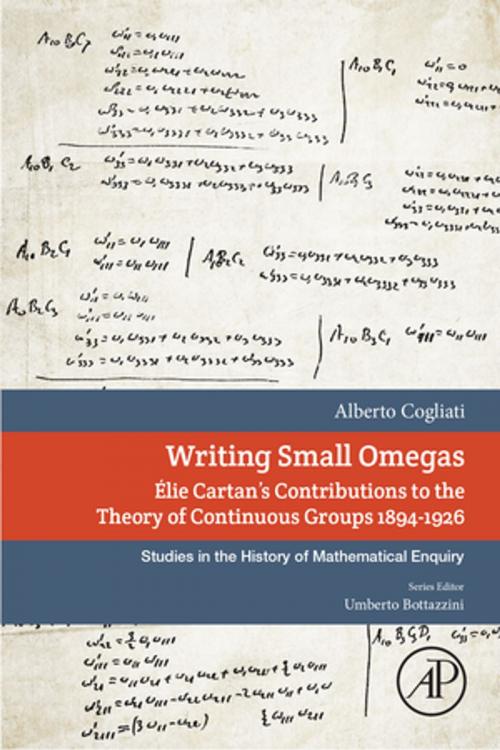Writing Small Omegas
Elie Cartan's Contributions to the Theory of Continuous Groups 1894-1926
Nonfiction, Science & Nature, Mathematics, Applied| Author: | Alberto Cogliati | ISBN: | 9780128142745 |
| Publisher: | Elsevier Science | Publication: | October 24, 2017 |
| Imprint: | Academic Press | Language: | English |
| Author: | Alberto Cogliati |
| ISBN: | 9780128142745 |
| Publisher: | Elsevier Science |
| Publication: | October 24, 2017 |
| Imprint: | Academic Press |
| Language: | English |
Writing Small Omegas: Elie Cartan's Contributions to the Theory of Continuous Groups 1894-1926 provides a general account of Lie’s theory of finite continuous groups, critically examining Cartan’s doctoral attempts to rigorously classify simple Lie algebras, including the use of many unpublished letters. It evaluates pioneering attempts to generalize Lie's classical ideas to the infinite-dimensional case in the works of Lie, Engel, Medolaghi and Vessiot. Within this context, Cartan’s groundbreaking contributions in continuous group theory, particularly in his characteristic and unique recourse to exterior differential calculus, are introduced and discussed at length.
The work concludes by discussing Cartan’s contributions to the structural theory of infinite continuous groups, his method of moving frames, and the genesis of his geometrical theory of Lie groups.
- Discusses the origins of the theory of moving frames and the geometrical theory of Lie groups
- Reviews Cartan’s revolutionary contributions to Lie group theory and differential geometry
- Evaluates many unpublished sources that shed light on important aspects of the historical development of Lie algebras
Writing Small Omegas: Elie Cartan's Contributions to the Theory of Continuous Groups 1894-1926 provides a general account of Lie’s theory of finite continuous groups, critically examining Cartan’s doctoral attempts to rigorously classify simple Lie algebras, including the use of many unpublished letters. It evaluates pioneering attempts to generalize Lie's classical ideas to the infinite-dimensional case in the works of Lie, Engel, Medolaghi and Vessiot. Within this context, Cartan’s groundbreaking contributions in continuous group theory, particularly in his characteristic and unique recourse to exterior differential calculus, are introduced and discussed at length.
The work concludes by discussing Cartan’s contributions to the structural theory of infinite continuous groups, his method of moving frames, and the genesis of his geometrical theory of Lie groups.
- Discusses the origins of the theory of moving frames and the geometrical theory of Lie groups
- Reviews Cartan’s revolutionary contributions to Lie group theory and differential geometry
- Evaluates many unpublished sources that shed light on important aspects of the historical development of Lie algebras















